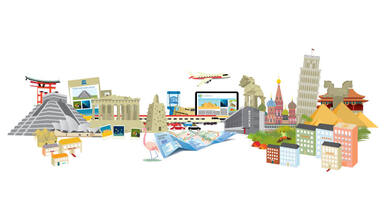UNESCO Joins Launch of International Year of Sustainable Tourism 2017
On 18 January 2017, UNESCO’s Assistant Director-General for Culture, Francesco Bandarin, took part in the official launch of the International Year of Sustainable Tourism for Development organized by the World Tourism Organization (UNWTO) in Madrid, Spain. With the presence of Spanish and international dignitaries, representatives from international organizations and civil society, the event offered an opportunity to explore and highlight the role of tourism in sustainable development.
Taleb Rifai, Secretary-General of the UNWTO, underscored international tourism’s potential for positive change, prosperity and wellbeing for all. “As our sector continues to grow, so does its responsibility to propel us into a future of sustainability, equity, inclusion and peace,” he said. “With over 1.2 billion people now crossing international borders each year, tourism represents a golden opportunity to break down the barriers of ignorance and prejudices,” states Director-General of UNESCO Irina Bokova in her message for the International Year.
While playing an important role in fostering intercultural exchange and dialogue, tourism is a major source of economic growth for many of the world’s developing countries. Cultural and natural heritage sites, intangible cultural heritage, performing arts and museums are among the many interests that engage tourists and thereby generate revenues, employment, investments and social benefits. “Tourism represents around 30% of service exports, and directly and indirectly contributes to around 10% of global GDP,” noted Bandarin.
UNESCO World Heritage sites (1052), Biosphere Reserves (669), Global Geoparks (119) and Creative Cities (116) represent incredible opportunities for tourism to be a positive force for sustainable development, conservation and environmental protection. However, if unplanned, tourism can be socially, culturally and economically disruptive, and have a devastating effect on fragile environments. “Ancient monuments can be damaged and intangible cultural heritage can be lost if not properly safeguarded. Our goal is to build a positive dynamic between heritage and tourism,” said Bandarin.
An approach where preservation and planning go hand in hand with the sustainable development of tourism is important. For example the UNESCO World Heritage and Sustainable Tourism Programme provides an international framework for cooperation and broad stakeholder engagement on shared and sustainable outcomes related to tourism – tying sustainability together with national pride, community benefit, economic development and heritage conservation.
When the United Nations General Assembly declared 2017 as the International Year of Sustainable Tourism for Development it designated UNWTO to lead the celebrations. Given their long history of close collaboration, UNESCO and UNWTO will work together to use this year to draw wider attention to the potential of tourism to contribute to the 2030 Agenda for Sustainable Development, as well as address the challenges associated with it. A number of joint initiatives will take place, including the World Conference on Tourism and Culture: Fostering Sustainable Development, in Muscat, Oman in December 2017.
Following the launch event, Bandarin and Rifai met to discuss areas of enhanced cooperation between the two Organizations in the course of the Year and beyond.
Related links:

